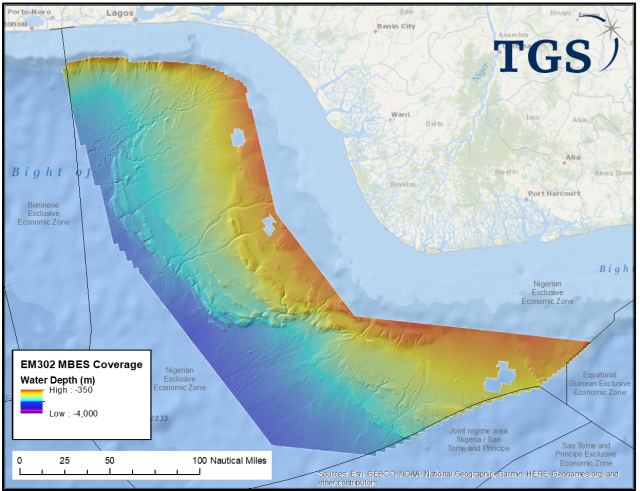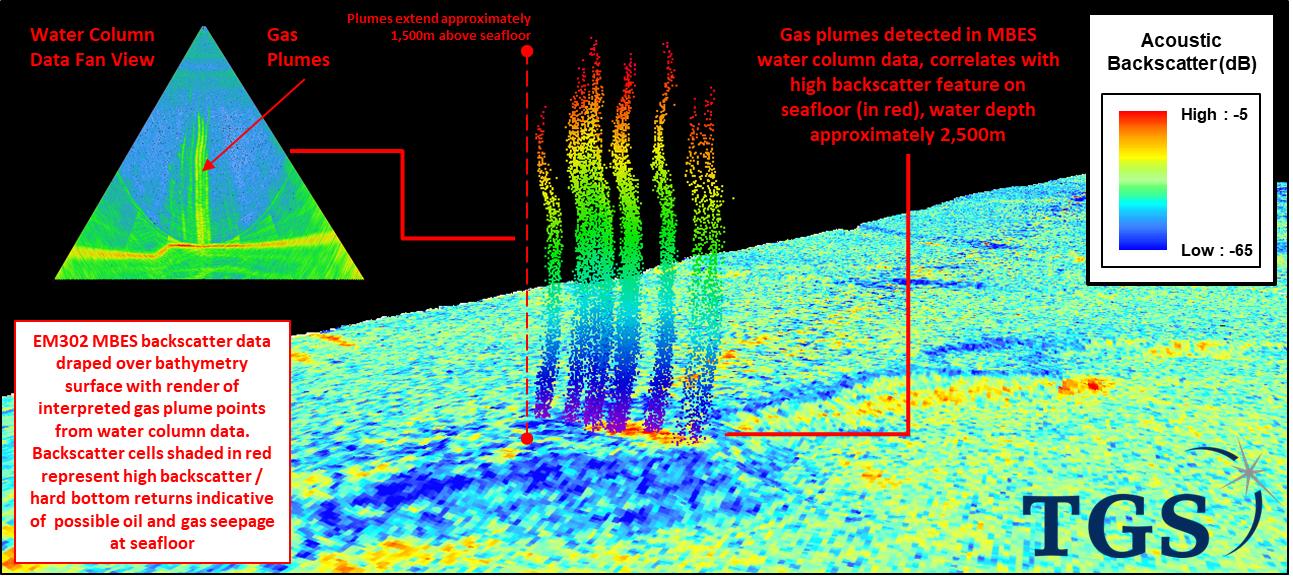
TGS Nigeria Seep Program MBES coverage. (Source: TGS)
TDI-Brooks International Inc. has completed the offshore multibeam phase for TGS offshore the Niger Delta, the company said on May 15. This survey took place in water depths of 750 m to 3,500 m and is Nigeria’s first regional multiclient, multibeam and seafloor sampling (MB&SS) study.
TDI-Brooks’ R/V Gyre acquired 82,000 sq km (31,660 sq miles) of high-resolution hull-mounted multibeam echo sounder data. During the multibeam data collection, 1,223 active hydrocarbon seeps were detected in the multibeam water column data. Onboard hydrocarbon seep analysis was conducted in near real-time onboard the vessel to expedite the process of core selection.

The R/V Proteus is scheduled to begin acquisition of the follow-up surface geochemical exploration (SGE) coring campaign in July 2020, where approximately 245 piston core samples targeting suspected seep features selected from the MBES dataset will be collected, along with an additional 45 additional piston core samples for geotechnical and biostratigraphic studies. An additional 17 surface heat flow measurements will also be collected as part of the program.
SGE is a petroleum prospecting tool based that traces upward migrated petroleum from deep source rocks and reservoirs in targeted seabed sediments and is used to evaluate exploration potential.
Modern SGE campaigns utilize an integrated approach to identify seepage on the seafloor, pinpoint core locations, and accurately characterize geochemical results. The science and art of this seep hunting involves proper selection of core sites from the geophysical records, safe and skilled acquisition of seabed cores at these exact sites, analytically distinguishing promising samples from samples with varying levels of natural background concentrations, and properly interpreting the geochemical results in a geologic context.
SGE campaigns are a low-cost exploration tool that provides insight into reservoirs at depth before a well is ever drilled.
Recommended Reading
Enbridge Advances Expansion of Permian’s Gray Oak Pipeline
2024-02-13 - In its fourth-quarter earnings call, Enbridge also said the Mainline pipeline system tolling agreement is awaiting regulatory approval from a Canadian regulatory agency.
Moda Midstream II Receives Financial Commitment for Next Round of Development
2024-03-20 - Kingwood, Texas-based Moda Midstream II announced on March 20 that it received an equity commitment from EnCap Flatrock Midstream.
Bobby Tudor on Capital Access and Oil, Gas Participation in the Energy Transition
2024-04-05 - Bobby Tudor, the founder and CEO of Artemis Energy Partners, says while public companies are generating cash, private equity firms in the upstream business are facing more difficulties raising new funds, in this Hart Energy Exclusive interview.
JMR Services, A-Plus P&A to Merge Companies
2024-03-05 - The combined organization will operate under JMR Services and aims to become the largest pure-play plug and abandonment company in the nation.
Chesapeake Slashing Drilling Activity, Output Amid Low NatGas Prices
2024-02-20 - With natural gas markets still oversupplied and commodity prices low, gas producer Chesapeake Energy plans to start cutting rigs and frac crews in March.





